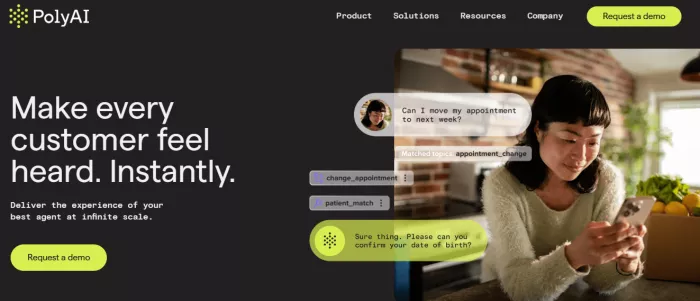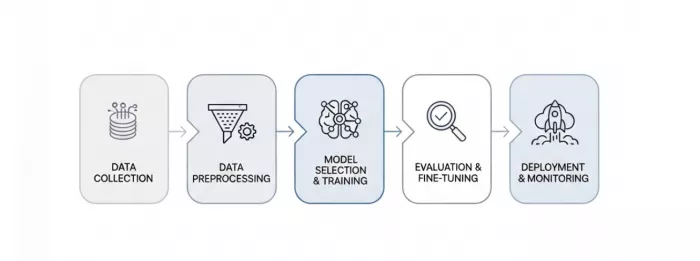
Think about the last time you called a customer support line. Did you wait on hold for too long? Did the automated menu confuse you before you finally reached a human?
Phone calls remain one of the most widely used support channels, especially when customers want urgent help with bookings, payments, deliveries, or troubleshooting. Yet, too often, automated systems make the experience frustrating.
This is where PolyAI comes in. A London-based startup, PolyAI builds voice-first conversational agents that hold natural, human-like phone conversations. Instead of long menus or robotic voices, callers can simply say what they need, and the AI handles it.
But what exactly is PolyAI? How does it work? And what do real users say about it? Let’s break it down.

PolyAI was founded in 2017 as a spin-out from Cambridge University by a team of dialogue-system researchers. Their vision was clear: create conversational AI that sounds natural, understands complex speech, and can handle real-world customer service tasks.
Unlike most chatbot companies that started with text and later added voice, PolyAI was built for voice from day one. This focus means it’s better at handling interruptions, long sentences, accents, and even background noise during calls.
PolyAI’s clients are mostly large enterprises with high call volumes including banks, hotels, casinos, logistics firms, and travel companies. The promise? Shorter wait times, higher customer satisfaction, and lower costs for businesses.
Here are the standout features that make PolyAI unique in the conversational AI space:
1. Voice-First Natural Dialogue
PolyAI’s technology is designed for real-world phone conversations. It manages interruptions gracefully, understands accents, and can pick up on long and complex customer queries without breaking the flow.
2. Omnichannel Experience
While voice is its core strength, PolyAI also works across chat, SMS, and other digital channels. Customers can start on a call and continue over text without losing context.
3. Agent Studio – Low-Code Builder
PolyAI provides a tool called Agent Studio, a no-code/low-code platform that allows teams to design conversational journeys, connect databases, and test different flows without needing advanced programming skills.
4. Agent Assist & Analytics
The system doesn’t just replace humans — it also helps them. Agent Assist provides real-time suggestions to live agents, while the analytics dashboard tracks trends, call outcomes, and areas for improvement.
5. Multilingual Support
PolyAI supports multiple languages and can adapt to regional phrasing and accents. This makes it valuable for global companies serving diverse customer bases.
6. Enterprise-Grade Security
As expected from an enterprise solution, PolyAI comes with strong compliance measures, CRM integrations, and reliability features needed for mission-critical support.
If you’re wondering how a business actually sets up PolyAI, here’s the simplified process:

PolyAI is mainly adopted by large enterprises with high call volumes. Case studies highlight industries such as:
Its enterprise focus means pricing is structured around usage (minutes of call time) or large-scale contracts. Smaller startups may find it less accessible.
PolyAI isn’t just attracting customers, it’s also gaining strong investor confidence. In recent years, it raised funding rounds backed by NVentures (NVIDIA) and Khosla Ventures, with reports valuing the company close to $500 million.
This reflects a broader trend: enterprises are investing heavily in voice automation as customer expectations rise and live-agent costs remain high.
When it comes to AI voice assistants, nothing speaks louder than real user feedback. We looked at G2 enterprise reviews and Reddit user discussions to bring you an honest snapshot of how PolyAI performs in the real world.
Rating: 5.0 / 5 stars
Number of Reviews: 11
What Businesses Love
Human-like voice quality
“Provides human like voice that is of the highest quality imaginable. Certainly avoids a robot like voice.”
Quick to set up & integrate
“The interface is simple and very user friendly. We have been able to integrate it with various software systems.
Proven business impact
“Poly AI handled 87% of non-revenue calls on day one driving a much better CX.”
“Operating around the clock with a 100% call answering rate … ensures a superior guest experience.”
Responsive support team
“Knowledgeable, adaptable, and responsive … we feel confident that we have their support.”
Where It Falls Short
On Reddit, the discussion around Poly.ai leans more toward roleplay, chat, and open-ended use.
What Users Appreciate
Fewer restrictions
“Polly.ai … does not have these filters. You can say and do whatever you want with the bot.”
Fun for roleplay & storytelling: Many users enjoy the more “free-form” experience compared to competitors like Character.AI.
The Frustrations
Weak memory
“It has an extremely short and confusing memory … ruins my whole immersion.”
Less polished dialogue
“The bot's language model is not as polished as that of c.ai.”
Voice glitches
“The voice acting … glitches and sounds like a British guy every time.”
Limited personalization and requires a premium
“Polly. ai does not offer the option of personas … you just have a small text box to suggest a relationship.”
If your organisation is evaluating PolyAI, here are some practical steps to maximise success:
In short: If your organisation needs a voice AI that feels truly conversational, PolyAI is worth serious consideration. It won’t completely replace human agents, but it can make customer support faster, smoother, and more enjoyable — for both companies and the people they serve.
Discussion